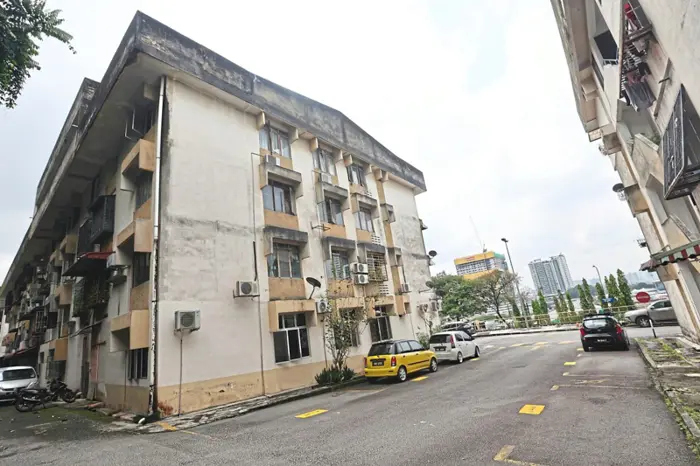Redevelopment plan weighs on minds of property owners in KL
THE naming of 139 public and private properties in Kuala Lumpur for potential redevelopment is causing some owners sleepless nights.
The properties, which are named in the Kuala Lumpur Structure Plan 2040 (KLSP2040), include 91 residential strata buildings.
Owners, especially those living in private residences, said the would-be developers and agents had been knocking on their doors to get them to agree to redevelop their properties.
Some are concerned if these developers have the resources and know-how to undertake such redevelopment projects.
Gurmit Cheema, an owner of a unit in Pangsapuri Cantik in Kuala Lumpur, said while some owners were for redevelopment, others were against it.
He said residents of the low-density flats had been approached by interested parties since May.
“We attended presentations given by the project proponent. Some of us feel that we are being pressured to agree.

A new pulse in BP monitoring
“In this type of scenario, there will always be those who are willing (to redevelop), those who are against and some who are on the fence,” he said, adding that the residents comprised mostly senior citizens.
Although Pangsapuri Cantik was about 40 years old, the three blocks were still in good condition, Gurmit added.
 Residents of Pangsapuri Cantik like Gurmit were approached with a redevelopment offer this year.
Residents of Pangsapuri Cantik like Gurmit were approached with a redevelopment offer this year.
“It is not dilapidated to the extent that redevelopment is needed. Most of the 87 units are occupied by the owners.
“They (proponents) cannot move forward unless they have 100% consent.
“But we are worried that this could change if the proposed Urban Redevelopment Act (URA) is passed,” he said.
Under the Act, the Housing and Local Government Ministry is proposing for an owners’ consent threshold of 80% for strata properties less than 30 years and 75% for those older than 30 years.
Gurmit, whose brother and several other family members also own units at Pangsapuri Cantik, is worried that their voices will be drowned out if the proposed Act comes into force.
“It is unfair if those who do not want redevelopment are forced into agreeing,” he said.
Another owner-resident is Lee Cheok Seng, who bought his unit at Pangsapuri Cantik last year.
“There is no guarantee that the projects will be completed or be abandoned halfway if redevelopment plans go ahead,” he said.
Lee said if this were to happen, it would be almost impossible for owners to purchase any other property due to their age.
 Lee: At a time when we should be living peacefully, we face uncertainty about our housing situation.
Lee: At a time when we should be living peacefully, we face uncertainty about our housing situation.
“At a time when we should be living peacefully, we are being pressured to start over again and face uncertainty about our future housing situation.”
The redevelopment proposal includes new units for existing owners upon project completion.
In nearby Taman Segar, a group of residents have been fighting since 2018 against a redevelopment plan which will affect some 300 units.
Property owner Elya Choong said the proposal included building new housing on public land.
The plan, she said, was for the building of a high-rise on what now houses a playground and community hall.
“If that project proceeds, residents from the surrounding three blocks of walk-up flats will be relocated there.
“The old blocks, where my current unit is, would then be demolished to make way for more housing units.
“Some have consented to the project while others have rejected it.
“It is not right for public land to be taken away for private use,” said Choong, who is also worried about the proposed Act.
Those who are not opposed to the URA said the process must be transparent.
 Choong is one of the ownersagainst a redevelopment plan forTaman Segar flats.
Choong is one of the ownersagainst a redevelopment plan forTaman Segar flats.
One of them is a unit owner, who did not want to be named, of an old flat in Taman Cantik.
He has been asked to consider a redevelopment proposal.
“I think we need redevelopment. My flat is old.
“There are leaking issues, among many other problems.
“My concern is that owners can be taken advantage of if there is no regulatory framework or even a centralised authority to oversee the process.
“How are owners supposed to determine by themselves if a developer is qualified to undertake such a project?
“Are there any safeguards if the project is not completed?” he questioned.
He added that there should also be a set of regulations for developers as well as guidance given to owners on their rights in navigating redevelopment plans.
Housing and Local Government Minister Nga Kor Ming was reported to have said, in Parliament, that a mediation committee would be set up to resolve any disputes that could arise during the urban redevelopment process.
The Bill is expected to be tabled in Parliament next year.


